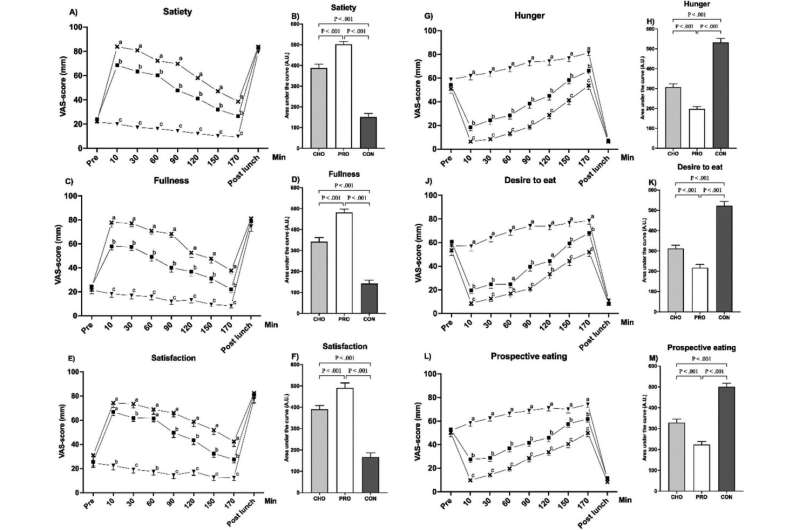This article has been reviewed according to Science X's editorial process and policies. Editors have highlighted the following attributes while ensuring the content's credibility:
fact-checked
trusted source
proofread
Protein-rich breakfasts found to boost satiety and concentration

A new Danish study has explored the link between diet and cognitive function, and the results reveal that a protein-rich breakfast can increase satiety and improve concentration. This is important knowledge in a society with increasing obesity rates and lifestyle-related diseases, say researchers.
"Breakfast is the most important meal of the day." This is a well-worn platitude that has never had much basis in scientific evidence.
However, a new Danish study has explored how different types of breakfast affect satiety and concentration, and it has added new fuel to the old cliché.
The study followed 30 obese women aged 18 to 30 for three days, during which the women consumed a protein-rich breakfast, a carbohydrate-rich breakfast or no breakfast at all. The women's sense of satiety, hormone levels, and energy intake were measured at lunchtime. Their total daily energy intake was measured as well.
The participants also had to complete a cognitive concentration test during the study.
"We found that a protein-rich breakfast with skyr (a sour-milk product) and oats increased satiety and concentration in the participants, but it did not reduce the overall energy intake compared to skipping breakfast or eating a carbohydrate-rich breakfast," says Mette Hansen, associate professor and Ph.D. at the Department of Public Health, and one of the authors of the study.
A possible strategy to combat obesity?
The number of overweight people is increasing both in Denmark and across the globe. Obesity is often accompanied by lifestyle-related diseases such as type 2 diabetes.
Previous studies have shown that people who eat breakfast have a lower BMI than people who do not eat breakfast and protein-rich foods have generally been shown to have an increased satiety effect compared to carbohydrate-rich and high-fat foods with the same calorie content.
The idea was, therefore, to test whether a protein-rich breakfast could be a good strategy for achieving greater satiety during the day and thus reducing daily calorie intake.
However, the solution is not that simple, says Mette Hansen:
"The results confirm that protein-rich meals increase a sense of satiety, which is positive with regard to preventing weight gain. However, the results also suggest that for this nutritional strategy to be effective, it's not enough just to eat a protein-rich breakfast."
Intriguing difference
The potential of replacing a carbohydrate-rich diet with a protein-rich diet can clearly be seen in the satiating effects measured in the study.
Several of the subjects had difficulty consuming the entire protein-rich breakfast consisting of skyr and oats.
"It's intriguing that there can be such a big difference in the satiety effect of two different meals with the same calorie content. Had the women in the project been allowed to choose the size of the meal themselves, it's likely that they'd have consumed more food and thereby more calories on the day they were served bread and jam than on the day they were given skyr and oats," explains Mette Hansen.
Further research needed
According to the researcher, although the study has provided important insights, it also has its limitations because only overweight young women participated in the study. The study is also based on relatively short-term observations, leaving open the question of how long-term dietary changes can affect health and weight.
Mette Hansen, therefore, points out that the study underlines the need for further research to understand how different types of food affect health over time.
"We already have new data incoming from a trial where participants received either a high-protein breakfast or a low-protein breakfast. The objective was to study how the different types of breakfast affect body composition and other parameters such as microbiota and cholesterol levels," says Mette Hansen.
According to Mette Hansen, the results of these studies may result in the development of more targeted nutritional recommendations in the future.
The study is published in the Journal of Dairy Science.
More information: L.B. Dalgaard et al, A dairy-based protein-rich breakfast enhances satiety and cognitive concentration before lunch in young females with overweight to obesity: A randomized controlled cross-over study, Journal of Dairy Science (2023). DOI: 10.3168/jds.2023-24152





















